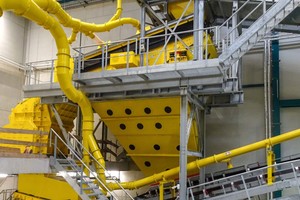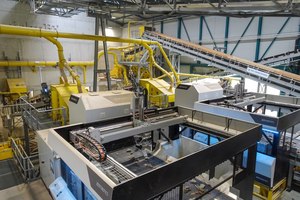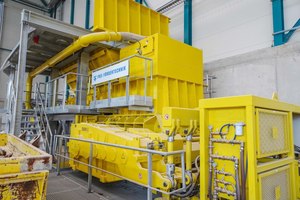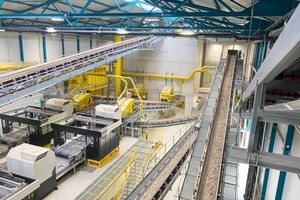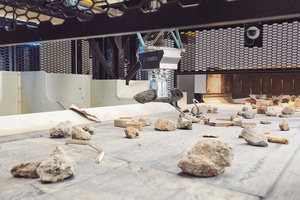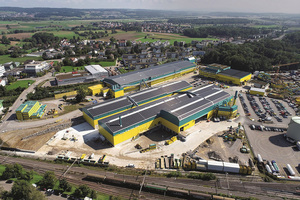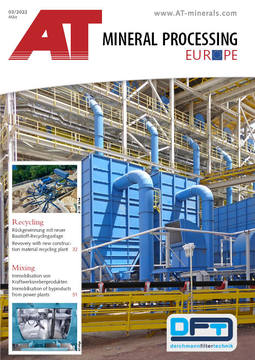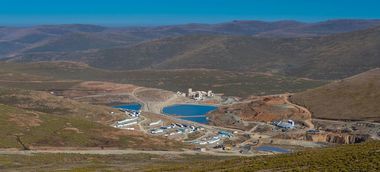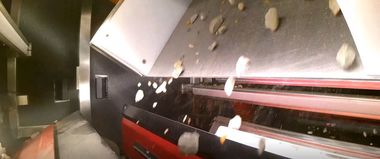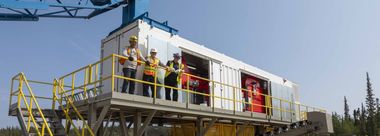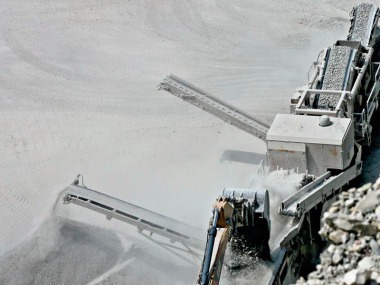Overall conveyor system for the circular construction processing centre
EbiMIK stands for Eberhard – materials in a cycle. The mega-trend of a circular economy means a greater need for high-quality recycling products. The existing Ebirec building materials recycling centre in Rümlang has reached the limits of quality and capacity in mixed demolition waste processing. In addition, an even higher product quality was sought.
Frei Fördertechnik AG from Rubigen took on the planning, implementation, assembly and commissioning of the construction waste processing plant as a complete turnkey system. With the construction of the modern processing centre, mixed demolition waste is processed into products of the highest quality and recycling in compliance with the law is ensured. This sets new standards in recycling management.
Sophisticated conveyor system and robots with artificial intelligence in use
The feed capacity of the conveyor system is 200 t/h. During demolition, the concrete and mixed demolition waste are already separated at the construction site and transported to Rümlang (Ebirec) or Oberglatt (EbiMIK). The weight is then recorded at the input terminal. The sorting hall at EbiMIK is equipped with a sorting excavator weighing almost 100 tonnes. This carries out an initial coarse pre-sorting of the impurities. The material is filled into the sophisticated transport system by the sorting excavator. This transports the material to the two-roll crusher (sizer) for optimal crushing for the subsequent robot sorting section. Material larger than 300 mm enters the double roll crusher and is gently crushed. The discharge grain does not exceed 400 mm. The material stream is brought together and separated from metal parts by means of overband magnets. The extracted metal is collected centrally for recycling.
On two robot lines, each with three gripper arms, the unwanted materials are separated from the mineral materials. The robots sort the construction waste into various new secondary products. The robot separates mineral materials from foreign materials such as plastic, gypsum, wood, light metal, etc. With the robots’ artificial intelligence, the materials are recognised via four sensor boxes. The robots are internationally networked and learn from each other. In order to operate the robots up to 24 hours a day and keep them flexible, a buffer silo was provided in advance.
The robots can sort out heavy pieces up to 30 kg, which are not allowed for humans according to Suva and are therefore not feasible. Humans would actually be better at sorting, but unfortunately only in the short term, because the robot ensures 24-hour continuous constant performance and reliable quality with up to 12 000 picks per hour. The recyclables produced are collected in drop boxes or transported to the raw materials warehouse on robust conveyor belts.
After the sorting section, the mixed demolition waste is crushed to 0 – 32 mm and conveyed to a storage hall. The raw materials warehouse can store up to 60 000 t of secondary raw materials. The distribution belts discharge the material layer by layer into the raw material store. This creates a raw material that is as homogeneous as possible. The control system is able to run different storage strategies. Further refinement takes place in the downstream component production. Direct loading onto lorries or rail is carried out by an efficient metering system with a loading capacity of 800 t/h.
New age of circular construction
With the new EbiMIK processing centre for construction waste and the new type of zirkulit® concrete, the Eberhard companies are taking the step from the recycling economy to the circular economy. Frei Fördertechnik is proud to have contributed to the transformation into the new age of circular construction – sustainable, value-preserving, resource-saving and environmentally optimised.

